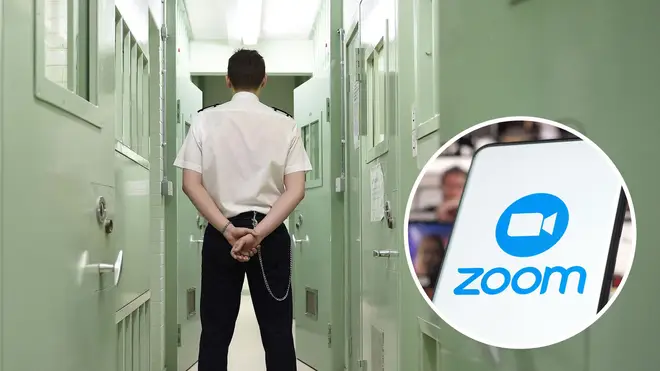
Clare Foges 6pm - 9pm
21 February 2024, 09:40 | Updated: 21 February 2024, 10:35

An LBC investigation has found that 745 prison officers resigned before completing 12 months as qualified staff.
Chief Inspector of Prisons Charlie Taylor said he is “very concerned” that recruits are interviewed virtually, via platforms like Zoom.
The figures covered staff in England and Wales at HMPPS who resigned and left the service within a year of graduating from the training process, between September 2022 and September 2023.
The numbers are equivalent to roughly five prisons’ worth of staff. Almost 500 guards gave up prison work before making it to six months.
It costs the taxpayer on average £5,400 to put one recruit through prison officer training, meaning the government spent more than £4million on the staff identified in LBC research.
Reacting to the figures, Mr Taylor said prisons were facing a real challenge in hanging onto staff.
The prisons chief criticised the centralisation of recruitment, meaning governors don’t meet new staff until the first day they join a prison wing.
He told LBC: “I used to be a headteacher. The idea that I would employ a teacher without having met them is just completely fanciful.
“It’s very hard to assess online if they’ve got the resilience, what they think about prisoners, the values they have.”
A former prisoner officer, who spoke to LBC anonymously, said he wouldn’t recommend the job to anyone, and has accused his former bosses of threatening behaviour.
'Terry' spent three years working in an English prison and said it was sold to him as a good career, but in reality, it “really wasn’t”.
He told LBC about a code red incident he dealt with, when a prisoner had seriously self-harmed – an experience that will “stay with him for life”.
“The floor was covered in blood. This prisoner was covered in blood and I went in. There were cuts to his throat, his groin, his arms, his legs, his feet, his stomach. I did my best to stop the bleeding while waiting for paramedics,” he said.
“I ended up being in the cell for about an hour and a half, and within that time a couple of senior members of staff had kind of come in, looked in the cell and went ‘no’ and just walked away.
“We had kind of a debrief with a senior member of staff. I broke down in tears and I tried to sort myself out and go back to work, and he sent me home.
“But the next day, I got a phone call from the governor saying get back to work.”
On another occasion, Terry said he tore a muscle while restraining an inmate – an injury that required hospital treatment.
Despite colleagues witnessing the incident, he claims a manager accused him of deliberately sustaining the injury at the gym, and he was told “come in or you don’t get paid”.
Terry told LBC if anyone asks him about applying to be a prison officer, he advises them to “stay clear”, but in reality “they will hire anyone”.
“I've seen it time and time again with staff that come in, that have not even lasted a week. I don't blame them, you know. It's sold to you as a good career and a good job, but it's really not.”

Pia Sinha, a former Governor and now CEO of the Prison Reform Trust told LBC our figures should “alarm” officials.
The prison service is currently “failing to retain staff” despite getting a large number of recruits, Ms Sinha explained.
HMPPS is achieving around an 85% one-year retention rate for first-time prison officers, having recruited 5,000 new staff in the same period.
In 2021, around 452 prison officers had quit after less than a year in the service, and 2,400 had been hired.
Ms Sinha added: “It's really important to stress just how complicated and stressful the job of a prison officer is. It's probably rated as one of the most stressful jobs that anyone can do.
“So, to be able to do it successfully, you need an element of maturity. You need an element of wisdom. You need an element of experience.”
The Prison Reform Trust told LBC a retention crisis was caused by two key issues, pay and the working environment, and a top recommendation was to “invest, invest, invest” in staff.
The average starting salary of a prison officer is around £30,000, or over £40,000 in inner London.
Ms Sinha said overcrowding in prisons across the country has a negative impact on safety for both staff and inmates, because over-stretched services lead to “anger and frustration” among prisoners.
“When prisoners don't feel safe, they react in ways that make staff feel unsafe. And when staff feel unsafe, they withdraw, or they retreat," she said.
“It becomes a vicious cycle.”
In June 2023, a report from Parliament’s Justice Committee warned half of prison officers in England and Wales said they didn’t feel safe.
The Prison Reform Trust praised the introduction of mentors and welfare officers in each prison, to address these issues around job stress and support, but said it was likely not enough.
Lack of support was one of the key problems identified by Terry and The Prison Reform Trust, with both saying longer training, better care and mentoring of staff would hugely improve retention.
In January 2024, recruiters said they saw big increases in adverts for prison officers.
A Prison Service spokesperson said: “These figures are outdated and thanks to decisive actions such as boosting salaries and launching our biggest ever recruitment campaign there are now more than 1,600 frontline officers compared to the previous year and the proportion leaving the service continues to fall.”
Those feeling distressed or suicidal can call Samaritans for help on 116 123 or email jo@samaritans.org in the UK. In the US, call the Samaritans branch in your area or 1 (800) 273-TALK